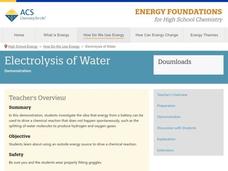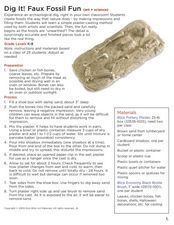Curated OER
Recycled Paper Making
Second graders investigate the life of a recycled newspaper by experimenting in class. In this recycling lesson, 2nd graders create their own recycled paper pulp by mixing an old newspaper into a bucket and adding water. Students...
Curated OER
Magazine Holder
Students investigate ways to save our environment by creating a recycled product. In this sustainable materials lesson plan, students create a magazine holder by recycling a large cardboard box and gift wrap or wallpaper. Students...
Curated OER
Displaying Populations: Jellybeans, Paper and People
Students investigate the factors affecting population growth. In this biology lesson, students collect data from the lab and graph them. They estimate population size using a mathematical formula.
Curated OER
Daily Weather Calendar
Third graders use the internet to record the daily weather conditions. Using symbols, they take the information they gathered and create an easy to read chart. They share their charts with the class to end the activity.
Curated OER
Seasons and Shadows: Investigate How Shadows Shift Throughout the Year
Students examine their shadows and why they are different in the summer and winter. In this seasons lesson plan students complete an activity to see how the earth's tilt on its axis changes the length of shadows.
Michigan State University
Interviewing
Do you have pests at your school? Find out through a series of interviews with school personnel. Scholars visit a variety of knowledgable individuals to ask them questions, record their answers, and present their findings to their peers.
California Academy of Science
How Big is Big?
In a math or life science class, "mini-me" models are created with cardstock to reflect a 1:10 scale of students' bodies. Learners measure each others' heights with meter sticks, and then reduce the size by 10. After this exercise, they...
American Chemical Society
Electrolysis of Water
Young scientists know that water is H2O, but can they prove it? Through a simple electrolysis of water demonstration, scholars see the two gases produced as a result of a chemical reaction. Because this reaction doesn't happen...
Out-of-School Time Resource Center
Nutrition and Physical Activity
Emerging nutritionists explore what it means to be healthy. In the beginning of the unit, your class will examine the five food groups and learn how food gets from the farm to our plates. This leads into the investigation of the...
Teach Engineering
Sugar Spill!
Sugar isn't good for you, but it's great for yeast! Scholars design an experiment to investigate how variables affect the rate of sugar consumption in yeast. The last installment of a nine-part Life Science unit considers how scientists...
Curated OER
Faux Fossil Fun
Elementary schoolers investigate how fossils are created by reproducing the process of creating an impression and filling it with a hardening material. The art lessons from this source are just fantastic! The lesson plan is well-written...
Curated OER
Water Quest
Students visit the Hydrology Study Site, conduct a visual survey to discover info about local land use and water quality, and document their findings by mapping the water body. They use this investigation to raise questions for further...
Curated OER
Check Out Lights and Shields with Beads
Students explore Ultraviolet detecting beads and conduct several investigations with them. In this investigative lesson plan students participate in an experiment to see the harmful effects of UV light and discuss their findings.
Curated OER
Chemical or Physical Change?
Eighth graders participate in several science activities to note chemical or physical changes after discussion. They understand that all matter has definite structure which determines physical and chemical properties.
Curated OER
Our Family Tree
High schoolers investigate their family heritage and plot their timeline. In this research lesson students study their family tree and forestry.
Curated OER
Habitat Collage
Students explore habitats. In this science lesson, students discuss habitats and the insects that are found within each habitat. Students create a habitat collage.
Curated OER
Look At What Nature Has Done!
Learners examine how easy it is to break rock. They investigate weathering and erosion in a number of activities.
Curated OER
The Squeeze is On
Students investigate the force of compression and how it acts on structural components through a hands-on group project. They use everyday products such as paper, toothpicks, and tape to construct a structure that will support the...
Curated OER
Upgrading Hubble
Learners investigate the Hubble telescope's role in astrophysics research. They complete a Webquest, watch a video, view Hubble photographs, play online games, answer discussion questions, and evaluate newspaper articles about optics.
Curated OER
Lead Extraction
Students investigate one method used in the detection of lead in the soil. They use a Lead Check Soil Kit to safely obtain results in 30 minutes or less in levels of 400 ppm or above. In addition, they write a brief description of what...
Curated OER
Writing About Winter
Students investigate the concept of winter as a season and they write an essay as a reflection upon the acquiring of new information. The class should have a list of vocabulary or a word wall available for observation to aid in the...
Curated OER
NASA Robots
Students investigate how robots are used in space. In this space science lesson, students participate in an experiment using a blindfold and complete assigned tasks. The students demonstrate how robots are "thinking" machines.
Curated OER
Lesson 3: Life Cycle of Brassica Plants
Students investigate the life cycle of brassica plants. In this science lesson, students observe each stage in the life cycle of their plant. Students record their observations and graph the data. Students
Curated OER
Newton's Laws and Winter Sports
Students investigate past winter Olympic games utilizing any skiing or snowboarding event to take Newton's Challenge. Helpful Web resources are provided and students enjoy learning science laws along with researching Olympic events.

























